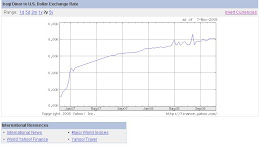On March 10, the Pentagon awarded the first contracts in its $18.6 billion, U.S.-funded reconstruction program, which officials say should create hundreds of thousands of jobs for locals. The spending will fix sewage treatment plants, bridges and all manner of broken infrastructure.
“We’re seeing a big increase in consumer goods flowing into the country,” said Maria Khoury, chief of research for Atlas Investment Group, a Jordanian investment bank.
Iraqi living standards are higher than at any time since the 1990 Gulf War. Oil revenues, which fund the government and its social safety net, are near prewar levels. The World Bank estimates that the economy will grow by 30 percent this year, after shrinking last year.
Underemployment is chronic. Iraq may have the world's best-educated taxi drivers and waiters.
The coalition authority can boast of notable successes that U.S. officials argue have laid the groundwork for Iraq’s prosperity.
The most important one may have been the changeover last September to new paper money, minus Saddam’s portrait. While many postwar countries suffer from hyperinflation and currency devaluation, the Iraqi dinar has gained value against the dollar since last fall.
“Iraqis would not be placing their savings in this currency and buying more of it if they didn’t believe in its future,” said Olin Wethington, a top coalition economic adviser.
The Coalition Provisional Authority and the Governing Council also passed a new investment law allowing 100 percent foreign ownership in most sectors.
Last month, three foreign banks were granted licenses to open branches. Coalition officials also have helped write a commercial banking law and a central banking law, and have begun work on reopening the Baghdad Stock Exchange.
Mitsubishi Motors announced in January that it would open a Baghdad dealership within two years and has already selected a site.
In January, Pepsi announced a deal with that company to rebuild the factory and begin selling Pepsi by June. The plant will employ up to 2,000 workers.
The Sultan Center, which operates some of Kuwait City’s biggest malls, has put forward a proposals to Iraq’s trade ministry for plans for a hotel and shopping complex, in Baghdad’s al Monsour neighborhood.
“We think this can be open in two years,” said Muthunna Darwish, the Sultan Center’s Iraqi-born company representative. “We see huge potential here.”

